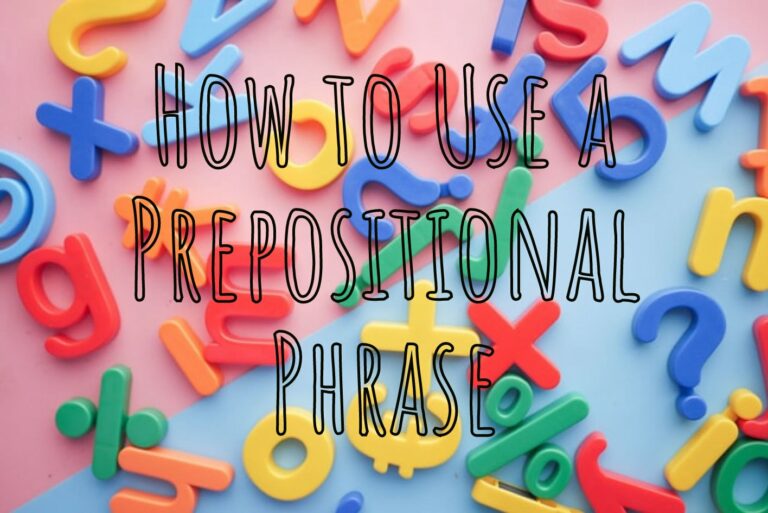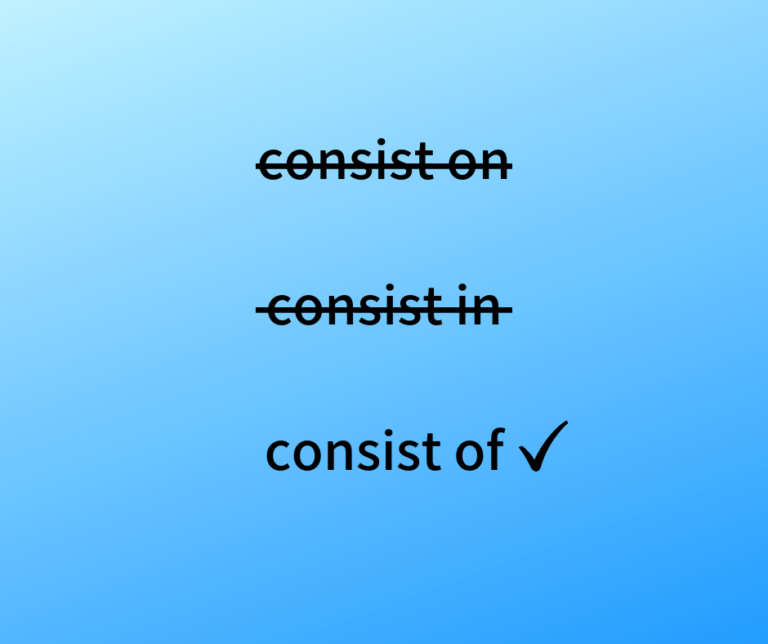50+ Preposition Mistakes That English Learners Make
If you’re an English learner, chances are you struggle with prepositions.
They’re incredibly tricky, and sometimes it seems like there is no logical reason for why we use certain prepositions in certain phrases. (On that note, see these 100 preposition collocations you should know.)
Because prepositions are so challenging, mastering them takes a long time. You can get moving in the right direction by making sure you aren’t making some common mistakes.
Here are 50+ common preposition mistakes, along with examples of correct usage. After you read the article, try the two practice exercises that go with the post:
Common Preposition Mistakes: Practice 1
Common Preposition Mistakes: Practice 2
We say depends on, not depends of.
“Your success in this class depends on how much you study.”
“Many of the people in this area depend on tourism.”
We say listen to + object, not listen + object.
“I’ve been listening to a lot of classical music right now.”
“Are you even listening to me right now?”
We say at night, not in the night.
This is confusing because it breaks the pattern. We say in the morning, in the afternoon, and in the evening, but at night.
“I don’t understand morning people. I do my best work at night.”
“Please don’t walk alone at night.”
We ask for something, not ask something.
“I’m not sure I feel comfortable asking for a raise. I’ve only been here six months.”
“It’s important to be independent, but it’s also important to know when to ask for help.”
We say consists of, not consists in.
“His new album consists of 15 brand new tracks.”
“What does Indonesian cuisine consist of?”
We say prefer to, not prefer than.
We say that we like something more than or better than something else, but we never say prefer than.
“I prefer Pepsi to Coke.”
“Do you prefer to write in pen or pencil?”
We say by + place, not for + place to communicate proximity.
“I can’t wait to spend the day reading by the pool.”
“Is Mike the guy standing by the window?”
We say by + method of transport, not for/in + method of transport to communicate how someone travels.
We can say that we are in a car, truck, van, etc., or on a bus, train, plane (public transport), but if we are talking about the method of transport (i.e. how we arrive somewhere), we use by.
“Do you prefer to travel by car or by bus?”
“Mark chose to travel by train so he could see the beautiful German countryside.”
We say arrive at + specific location and arrive in + country/city. Arrive to does not exist.
“The first thing I do when I arrive at work is make a fresh pot of coffee.”
“All of the world leaders have arrived in Washington for the summit.”
Note that we also use the verb get to communicate arrival. (Examples: “What time did you get home?”/”When did you get to class?”/”I got to work around 4:30 p.m.”)
We say discuss + something, not discuss about + something.
This is confusing because we can talk about something, speak about something, and argue about something, but we can’t discuss about something.
“Shall we discuss potential strategies?”
“The big event is in two weeks, and we haven’t even discussed it yet.”
Note that we can discuss something with someone. (Example: “I discussed the proposal with our clients.”)
We graduate from + a school, not graduate of/at.
This is confusing because we go to a school, and take classes at a school, but we graduate from a school.
“Do most people find a job immediately after they gradate from college?”
“Some of the world’s most successful entrepreneurs never graduated from college.”
We say respond to + object, not respond + object.
“We spend most of our work day responding to emails.”
“Part of the job description involves responding to client requests.”
We say inferior/superior to, not inferior/superior than.
“The metric system is far superior to other systems of measurement.”
“Neither British nor American English is superior to the other.”
We say capable of, not capable to.
“This plane is capable of reaching speeds over 400 miles per hour.”
“You don’t know what you’re capable of until you’re put to the test.”
We say worried about, not worried for.
“Martin’s friends were all worried about his drinking.”
“I could never live in Florida. I’d be too worried about alligators and hurricanes.”
We also say anxious about and concerned about. For more adjective + preposition combinations, see these collocations from englishpage.com.
We say to be married to, not to be married with.
“I’m married to a wonderful Costa Rican woman.”
“I like the idea, but I’m not married to it.”
If we use marry as a verb, we don’t use a preposition. (Example: “I married my wife in 1998.”)
We say good/bad at something, not good/bad in something.
“Karla is good at making people feel comfortable and open up.”
“I’m bad at remembering people’s names.”
Similar adjectives follow the same pattern (great at, terrible at, etc.).
Also, note that we can use the preposition in if we’re talking about an academic subject. (Example: “I’m good in math but terrible in history.”)
We say congratulations on something, not congratulations for.
“Congratulations on your new promotion.”
“Congratulations on the new house.”
If we use the verb to congratulate, we also use the preposition on. (Example: “Karen’s coworkers congratulated her on the birth of her daughter.”)
We say at + specific location, not in + specific location.
“I’m at the pool right now. I’ll call you when I get home.”
“We’re at the gym right now. We should be working out, not texting.”
We say responsible for something, not responsible to something.
“Everyone is responsible for ensuring a safe work environment.”
“We shouldn’t hold young children responsible for their actions.”
Note that we can be responsible to a person or group of people. (Example: “Our government officials are responsible to the people who elect them.”)
We say similar to, not similar as/than.
“I don’t think my childhood was in any way similar to yours.”
“Porpoises are similar to dolphins.”
We say related to, not related for.
“Actresses Audrey Hepburn and Katharine Hepburn had the same last name but weren’t related to each other.”
“Chris claims he’s related to the royal family, but we don’t believe him.”
We say go home, not go to home.
“I’m going to go home right after class.”
“Did you go home right after the movie?”
We say opposite of, not opposite to.
“The new app was a disaster. It was the complete opposite of user friendly.”
“One of John’s sons is just like him, but the other is the complete opposite of him.”
We say wait for someone/something, not wait someone/something.
“I’ve been waiting for you for over an hour. When are you going to get here?”
“The train just left. You’ll have to wait for the next one.”
We say enter the house/room/etc., not enter to.
“You must remove your shoes before entering the mosque.”
“Can the police enter your home without a warrant?”
We say despite or in spite of. Despite of does not exist.
“Despite their personal conflicts, the band was able to stay together for two decades.”
“In spite of their personal conflicts, the band was able to stay together for two decades.”
Also note that we use despite/in spite of before a noun or gerund. We don’t use despite/in spite of before a clause.
We say attend an event, not attend to event.
“If you don’t attend class, you might lose points.”
“Did you attend the conference last year, or is this your first time here?”
We say been to a town/city/country, etc., not been in.
“Have you ever been to Japan?”
“I had never been to the United States before, so I was nervous about my trip.”
We say smile at someone/something, not smile to.
“I smiled at the baby, and she immediately started crying.”
“Store clerks in the United States often smile at customers.”
Other facial expressions follow the same pattern. We can look at someone, stare at someone, frown at someone, glare at someone, laugh at someone, etc.
We say fill out paperwork/forms etc., not fill paperwork/forms.
In American English, we fill out paperwork, a form, etc., but fill in the individual spaces or blanks on a form. In British English, fill in is generally preferred over fill out.
“I hate it when you go to a new doctor’s office and you have to fill out twenty pages of forms.”
“Would you mind filling out a short questionnaire?”
We say put music on, not put music.
“Our teachers sometimes puts music on while we’re writing.”
“Could you put some music on, please? I’m falling asleep.”
Note that we can also say play music. (Example: “Sometimes I play music while I’m working out.”)
We say pay for an item/service, not pay an item/service.
We say pay rent, pay bills, pay the bill, pay the check, and pay taxes, but for most purchases, we say pay for.
“Who paid for dinner?”
“Look at this receipt. I think I paid too much for the coffee. It was supposed to be on sale.”
We say the same as, not the same to.
“Tourists can’t believe how quaint the village is. The village and its people are the same as they were fifty years ago.”
“Yes, we’re twins, but that doesn’t mean I’m exactly the same as my sister.”
We say think about/of, not think in.
Generally, think about means to consider or think actively about something, whereas think of means to remember something or keep something in mind.
“Gerald thought of his grandmother every time he drove the car he inherited from her.”
“When I was a college student, I tried not to think about the debt I was incurring.”
We say key to the door, and door to the room, not key of the door and door of the room.
We use to to communicate that something leads to something else (key to the door, door to the house, window to the soul, etc.).
“Is this the key to the front door or the back door?”
“The door to her bedroom was painted red.”
We say to lack something, not to lack of something.
“Your actions lack justification.”
“All of the snacks in the vending machine lack nutritional value.”
Note that we say lack of when we use lack as a noun. (Example: “I have a lack of experience with this technology.”)
On time and in time are two different expressions with two different meanings.
On time means you do something before an agreed/established time. It is the opposite of late.
“If you pay your rent on time, your apartment complex won’t fine you.”
“It’s important that we finish this project on time and under budget. We want to make a good impression on these clients.”
In time means you didn’t miss your chance to do something.
“You’re just in time for dinner. Have a seat and I’ll get you a plate and some silverware.”
“Fortunately the accident didn’t cause any fatalities. The paramedics were able to get the victims to the hospital in time.”
For similar examples, see these commonly confused preposition collocations.
We say close to or near, but not near to.
Note that near and close to are not always interchangeable. In some expressions, only one term may be used (e.g. a close friend, a near miss).
“I live close to the airport. Picking you up will be no problem.”
“Natalie likes to sit near the beach and watch the ships on the horizon.”
“If you’re cold, come sit near the fire.”
We say next/last Monday etc., not on next/last Monday etc.
“Next Monday is the deadline for submitting your application.”
“When was the meeting? Was it last Wednesday?”
With the verbs ask, tell, answer, and call, we don’t add to before the verb’s object.
“One of my students asked me a question I had trouble answering.”
“You’d better tell the police the truth, or you’re going to have a major problem.”
“Did you ever answer him?”
“Can you please call the cable company for me?”
We look for someone/something, not look someone/something.
“I’m looking for my brother? Have you seen him?”
“Well, I hope you find what you’re looking for.”
We dream about/of something or someone, not dream with.
Dream of means to want or desire something. Dream about means to literally have a dream about something.
“I often dream of leaving this town and moving to a small town in the French countryside.”
“Do you ever dream about old friends who you went to high school with?”
We say prevent something from happening, not prevent something to happening.
“Does Aspirin really prevent people from having heart attacks?”
“I can’t prevent you from doing it, but I can try to talk you out of it.”
We say addicted to, not addicted of.
“Millions of people are addicted to caffeine.”
“I have a friend who got addicted to skydiving.”
We say for + how long something lasts, not since/during + how long something lasts.
See this explanation on for/during from Cambridge Dictionary.
“I’ve been living in Orlando for two years.”
“Rita Moreno has been a Hollywood actress for over 65 years.”
We say brag about, not brag of.
“Mark always bragged about his athletic accomplishments in college.”
“Nobody likes it when you brag about your kids.”
We say accompanied by, not accompanied for.
“At soccer practice, Trina was always accompanied by her father.”
“Dessert was accompanied by port wine.”
We say met someone not met with someone to talk about encountering someone for the first time.
“Have you met any interesting people in your English classes?”
“I can’t believe we met 20 years ago. It doesn’t seem like it’s been that long.”
When we say meet with someone, it means that we had a meeting with that person. (Example: “I met with my supervisor to discuss my performance.”)
.
Mastering prepositions takes a lot of work. Here are some ways you can practice:
• Write example sentences with the collocations you have trouble with. To ensure you’ll remember the collocations, use real examples from your life.
• Always be on the lookout for word combinations that are different from the word combinations in your native language. These are the collocations that will probably give you the most trouble.
• Try the preposition exercises in the Practice Exercise section of this site.







